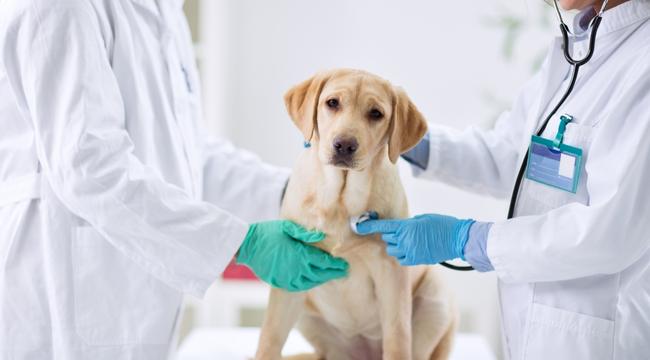
Seeing your dog cough up blood is alarming and can make you anxious. This guide will help you understand what to do immediately if you witness this distressing symptom.
If you notice your dog coughing up blood, seek veterinary attention right away. While it might not always indicate a severe issue, it could be a sign of a serious health problem that needs urgent care. Taking your dog to the vet promptly can prevent complications and ensure the best possible outcome for your pet.
Coughing up blood can signal various health issues, such as lung infections, heart disease, lung cancer, or a foreign object in the throat. Ignoring this symptom can lead to severe complications, so don’t hesitate to get your dog the veterinary care they need.
Read More: Ten ways to help treat kennel cough
Table of Contents
- Understanding the Appearance of Blood to Determine Underlying Causes
- What’s Wrong With My Dog? Is It Serious?
- Reasons For A Dog To Cough Up Blood
- How to Help Your Dog
- What’s The Best Time To Call The Vet?
- What Should You Do Before Visiting a Vet?
- How to Prevent Your Dog from Coughing Up Blood
- To Sum Up
Understanding the Appearance of Blood to Determine Underlying Causes

Dogs coughing up blood is a concerning sight for pet owners. The appearance of the blood can vary, depending on the underlying cause of the cough.
- If your dog is coughing up bright red blood, it typically means that the blood is fresh and undigested. This could indicate a cut in their mouth or a bleed in the upper airways.
- If the blood is dark and coffee-colored, almost like coffee grounds, it may suggest that your dog has a gastric ulcer.
- Frothy blood, on the other hand, may indicate congestive heart failure or severe lung disease.
Taking a picture of the blood your dog is coughing up and showing it to your veterinarian can help determine the underlying cause of the cough. While it may seem unpleasant, it can aid in making a quick and accurate diagnosis and treatment plan for your furry friend.
What’s Wrong With My Dog? Is It Serious?
It can be challenging to determine if your dog is suffering when they are coughing up blood, as they may not always show obvious signs of pain or discomfort. As a pet owner, you need to keep an eye out for any changes in your dog’s behavior. If your dog is coughing up blood, it is a sign of an underlying issue that requires urgent veterinary attention. Look for signs such as lethargy, loss of appetite, difficulty breathing, or restlessness. If you notice any of these symptoms, take your dog to the vet immediately. Remember that vomiting blood can be life-threatening, and getting your pet to the vet right away can be key to preventing further problems and making sure it has the best possible outcome.
Reasons For A Dog To Cough Up Blood
Dogs are susceptible to various health conditions that can cause them to cough up blood. Despite being a worrying sign for dog owners, it’s important to identify the underlying cause to get the right treatment. We’ll look at the common reasons dogs cough blood below.
#1. Hematemesis
Hematemesis the medical term for vomiting blood, can indeed cause a dog to cough up blood. This condition can result from gastrointestinal issues such as ulcers, tumors, or severe inflammation. In dogs, hematemesis might be mistaken for coughing up blood if the blood is expelled during retching or coughing fits. Causes of hematemesis can range from ingesting foreign objects or toxins to underlying diseases like pancreatitis or liver failure. Immediate veterinary attention is essential to diagnose and treat the underlying cause effectively, ensuring your dog’s health and well-being.
#2. Pulmonary Vascular Disease
Pulmonary vascular disease, which affects the blood vessels in the lungs, can indeed cause a dog to cough up blood. This condition can result from issues such as heartworm disease, pulmonary hypertension, or blood clots in the lungs. When the blood vessels in the lungs are compromised, it can lead to bleeding into the airways, which manifests as coughing up blood. Prompt veterinary attention is crucial to diagnose and manage pulmonary vascular disease, as it can be a serious and potentially life-threatening condition requiring immediate treatment to ensure your dog’s health and well-being.
#3. Tuberculosis

Tuberculosis (TB) in dogs, caused by the Mycobacterium tuberculosis bacteria, can indeed cause a dog to cough up blood. Though rare, TB can infect dogs through close contact with infected humans or other animals. The bacteria primarily affect the lungs, leading to symptoms such as a persistent cough, weight loss, lethargy, and coughing up blood due to lung inflammation and tissue damage. Given the serious nature of tuberculosis and its potential to spread, prompt veterinary diagnosis and treatment are essential. Treatment is often complex and requires long-term antibiotic therapy, emphasizing the importance of early detection and intervention.
#4. Injury of the Mouth
Injury to the mouth can indeed cause a dog to cough up blood. This can result from various factors, such as trauma from chewing on sharp objects, dental issues like broken teeth or severe gum disease, or even lacerations caused by accidents. When the mouth is injured, blood can enter the oral cavity and be coughed up, often appearing alarming to pet owners. Prompt veterinary care is essential to assess the extent of the injury, provide appropriate treatment, and prevent further complications like infections, ensuring your dog’s swift recovery and continued well-being.
#5. Lung Infection
Lung infections in dogs, such as pneumonia or bronchitis, can indeed cause a dog to cough up blood. These infections result from bacteria, viruses, fungi, or parasites, leading to inflammation and damage to the lung tissue. Symptoms of a lung infection include a persistent cough, difficulty breathing, fever, lethargy, and sometimes coughing up blood due to the irritation and rupture of small blood vessels in the lungs. Early veterinary intervention is crucial for diagnosing and treating lung infections, often requiring antibiotics, antifungals, or other medications to manage the infection and prevent serious complications.
#6. Dog Heartworm Disease
Dog heartworm disease, caused by the parasite Dirofilaria immitis, can indeed cause a dog to cough up blood. The heartworms live in the heart, lungs, and associated blood vessels, leading to severe lung disease, heart failure, and damage to other organs. As the disease progresses, the presence of heartworms and their larvae can cause inflammation and blockages in the pulmonary arteries, resulting in coughing, difficulty breathing, and sometimes coughing up blood due to ruptured blood vessels in the lungs. Early detection and treatment are vital to managing heartworm disease and preventing life-threatening complications. Regular preventive measures are also essential to protect your dog from this serious condition.
#7. Foreign Objects in the Stomach
Foreign objects in the stomach can indeed cause a dog to cough up blood. When dogs ingest non-food items, these objects can cause irritation, injury, or blockage in the gastrointestinal tract. If the object is sharp or abrasive, it can damage the stomach lining or esophagus, leading to internal bleeding. As a result, blood can be expelled through coughing or vomiting. Symptoms of foreign object ingestion include vomiting, abdominal pain, decreased appetite, and lethargy. Immediate veterinary attention is crucial to diagnose and remove the foreign object, preventing further injury and ensuring the dog’s recovery and health.
#8. Canine Congestive Heart Failure
Canine congestive heart failure (CHF) can indeed cause a dog to cough up blood. CHF occurs when the heart is unable to pump blood effectively, leading to fluid buildup in the lungs (pulmonary edema) and other tissues. This fluid accumulation can cause persistent coughing, difficulty breathing, and sometimes the expulsion of blood through coughing due to increased pressure and ruptured blood vessels in the lungs. Additional symptoms include fatigue, reduced exercise tolerance, and swollen abdomen or limbs. Early diagnosis and management by a veterinarian are essential to alleviate symptoms and improve the quality of life for dogs with CHF.
#9. Ingestion Of Toxins Or Poison
Ingestion of toxins or poisons can cause dogs to cough up blood. If your dog has eaten a toxic substance, such as a cleaning chemical or rat poison, they may cough up blood. This is because their body tries to fight the symptoms of toxicity.
If you know or suspect that your dog has eaten something toxic or poisonous, take them to the emergency vet immediately. It is also suggested that you call the Pet Poison Helpline to find out what treatment is best for your pet. Veterinarians from the Pet Poison Helpline will work with your emergency vet to come up with a good plan for your dog’s decontamination and treatment.
#10. Coagulopathy or Clotting Disorders
Coagulopathy or clotting disorders can be another reason why your dog is coughing up blood. If your dog’s nose starts bleeding or they start sneezing blood, it could be a sign of a clotting disorder. As the clotting disorder worsens, this can cause your dog to start coughing up blood with continued bleeding.
Clotting and coagulation disorders can be due to autoimmune diseases, poisons or toxins, tick-borne diseases, liver failure, or cancer. It is always best to bring your pet to the emergency room right away so blood work and imaging diagnostics can be performed to determine the cause of the bleeding and proper treatment for your pet.
#11. Mass in the Lungs that Has Ruptured
Cancer and other masses in the lungs can cause a dog to cough up blood if they rupture. Treatment options for lung masses include surgical removal and chemotherapy, both of which can be costly. The cost of surgery can range from $3,000 upwards, while chemotherapy can cost up to $10,000 in some cases.
#12. Severe Respiratory Infection
Respiratory infections such as pneumonia can cause damage and inflammation to the lungs, leading to coughing up blood. Mild respiratory infections can be treated with antihistamines or the steam from a hot shower. More serious infections may need antibiotics or hospitalization. The cost of treating a respiratory infection can range from $200 to $1500 or more.
#13. Gastrointestinal (GI) Ulceration
Gastrointestinal ulcers can cause dogs to cough up blood that looks like brownish coffee grounds. Vomiting, GI infections, or other underlying conditions can be the cause of these ulcers. Treatment for GI ulcers may include medication and, in severe cases, surgery to repair perforation of the stomach. The cost of treatment for GI ulcers can range from $300 to $5,000, depending on the severity of the condition and the required interventions.
In conclusion, coughing up blood in dogs is a symptom that should never be ignored. It is very important to see a vet as soon as possible to find out what’s wrong and start the right treatment. The cost of treatment for hemoptysis can vary a lot depending on what caused it, how bad it is, and what kind of medical care is needed. Early diagnosis and treatment can help make sure that your pet has the best possible outcome.
How to Help Your Dog
If your dog is coughing up blood or vomiting blood, it is important to take action to help them. While a visit to the vet is usually necessary, there are some steps you can take at home to help your dog.
#1. The first step is to feed your dog a bland diet of chicken and rice. If a gastrointestinal problem is what’s causing the blood, this may be helpful. It is important to monitor your dog’s eating habits and make sure they are still drinking water.
#2. The second step is to allow your dog to rest in a warm area away from other pets. If a respiratory issue is the cause of the blood, this will allow your dog to relax and be comfortable.
It is important to note that any medications should only be given after consulting with your vet. You should also keep an eye on your dog for any other health problems and take it to the vet if it acts strangely or coughs up blood more than once.
What’s The Best Time To Call The Vet?
In some cases, it may be necessary to take your dog to the vet immediately. If your dog keeps coughing up blood or throwing up blood, has pale or blue gums, has trouble breathing, isn’t eating or drinking, or is very tired, these are all signs that he needs to see a vet right away.
When you take your dog to the vet, they will likely run blood tests and take x-rays or ultrasounds to determine the cause of the blood. They may also test for heartworms if your dog is not on heartworm prevention and lives in an area known for heartworm disease.
Once the cause of the blood is determined, your vet will be able to treat your dog. This may involve heartworm treatment, surgery, or medication to treat an infection.
It is important to understand that some of the issues causing your dog to cough up blood can be life-threatening. But most respiratory problems can be treated, and not all of them are bad news.
What Should You Do Before Visiting a Vet?
Make sure you take pictures of the blood your dog coughed up or vomited before you visit your vet. This can help your vet determine the cause of the blood. It is also important to keep your dog calm and not allow them to exhaust themselves by playing.
How to Prevent Your Dog from Coughing Up Blood
Once you have been able to identify the main reason your dog is coughing up blood with professional help, treatment and prevention become easier. However, if your dog has Hematemesis, prevention may not be possible if, for example, it is gastric cancer.
On the bright side, your veterinarian can arrange a healthy diet and exercise for your dog, which may significantly help with gastritis and ulcers.
For Pulmonary Vascular disease, a healthy diet and exercise can work miracles in preventing build-ups in the arteries of your dog. At the same time, you can prevent heartworms through proper medication.
On top of that, you can prevent your dog from getting infected by Tuberculosis by keeping it away from infected human or animal patients. Furthermore, to prevent the bacteria of TB from infecting your dog, don’t let your dog eat the carcass of dead animals that may be carrying the bacteria.
For the most part, living in a clean and natural environment, eating a healthy diet, and regular exercising can keep most diseases at bay.
To Sum Up
It is okay for your dog to cough sometimes, and a simple home remedy for colds can cure that. Even when your dog is coughing up blood and is already in treatment with the veterinarian, you can give them soothing, hot soups to drink.
However, be very mindful of what you feed it because you don’t want to worsen its condition. Above all, you must take permission from your veterinarian before feeding your dog anything new.
On the whole, never miss any health check-ups for your dog with the vet so that even if there is a disease infecting it, the doctor can figure it out sooner. In any case, we hope this article was helpful and informative.



Great article addressing what to do when such issues arise. No one wants to have to practice these, but whenever (if ever) it happens, we are well aware. Also, I’ll like to stress how in situations like this, asides from dealing with the matter as a first aid, the vet shouldn’t be left out of the recovery process.